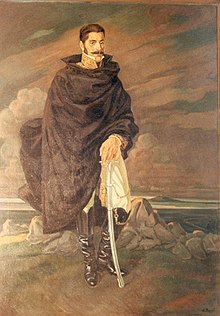Manuel Oribe
| Manuel Oribe | |
|---|---|
 |
|
| 2nd Constitutional President of Uruguay | |
|
In office March 1, 1835 – October 24, 1838 |
|
| Preceded by | Carlos Anaya |
| Succeeded by | Gabriel Antonio Pereira |
| Personal details | |
| Born |
August 26, 1792 Montevideo, Uruguay |
| Died | November 12, 1857 (aged 65) Montevideo, Uruguay |
| Nationality | Uruguayan |
| Political party | White |
| Spouse(s) | Agustina Contucci |
| Children | 4 |
| Profession | Military |
| Religion | Roman Catholicism |
| Signature | |
Manuel Ceferino Oribe y Viana (August 26, 1792 – November 12, 1857) was the 2nd Constitutional president of Uruguay.
Manuel Oribe was the son of Captain Francisco Oribe and María Francisca Viana, a descendant of the first governor of Montevideo, José Joaquín de Viana. At the beginning of the revolution of independence in the Rio de la Plata he enlisted in the patriot ranks as a volunteer.
His baptism of fire took place in the battle of Cerrito, on December 31, 1812, during the Second Siege of Montevideo, feat of arms that ended in a victory for the Patriots. He took part alongside José Gervasio Artigas' resistance against the Luso-Brazilian invasion in 1816.
In late 1817, with Montevideo already fallen into the hands of the Luso-Brazilians, Oribe moved to Buenos Aires along with his brother Ignacio and Colonel Rufino Bauza, taking with him the Freedmen Battalion and an artillery battalion.
The historian Francisco Bauza, son of Rufino Bauza, in his "Historia de la dominación española en el Uruguay" (1880-1882), argued that given the almost obsessive insistence of Artigas to name his favorite, Fructuoso Rivera, as military commander and the south of Río Negro to face the invasion, Rufino Bauza and Manuel Oribe would have come out against a situation that led to a violent exchange of words with Artigas, whose military situation was going out of hand.
The personal rivalry between Rivera and Oribe, which apparently dates of such events, the young officer decided to abandon his boss. Carlos Federico Lecor, commander of the occupying forces, offered no hindrance to the passage of eastern officials in Buenos Aires, even though he could not attract them to your cause. Rivera and his people were in the service of the invader Lusitanians.
In Buenos Aires, known by the certifying of stationery at the time, since 1819, Oribe, along with other easterns as Santiago Vazquez and residents who were equally opposed to the Brazilian Portuguese occupation and Artigas, have built a secret Masonic society, called the Society of the Eastern Knights, who waited at least until 1821, Cisplatin Congress to undertake a return to the, since then, called Cisplatina Province and begin work to reverse the situation.
Meanwhile, following the defeat of Artigas (and even before it) another section of the eastern elite had acceded to the occupants, accepting and in fact closely collaborating with the Portuguese. This is the only sector to be represented in Congress Cisplatin, 1821.
...
Wikipedia
